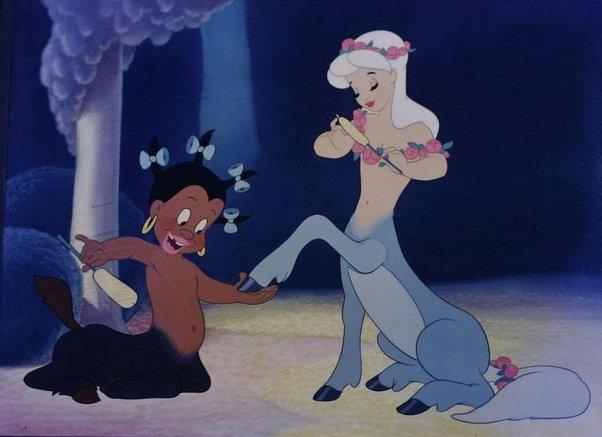
1 minute read
Censorship
During Lockdown in 2020, in the light of the Black Lives Matter movement, there was heightened awareness of the need to improve representation of black and minority ethnic people in television and film. On the 13th of June 2020 large numbers of films were censored from viewing, such as the 1939 Hollywood classic Gone With The Wind, for including representations of slavery. Disney’s awareness of some of their controversial and problematic choices related to ethnic representation in their past films predated this, as Disney have been self-censoring plots, dialogues, characters, and images for decades.
An example of a film where images and sections of the film are erased is the 1940 film Fantasia. Figure 6 shows screengrabs from both the original and the updated censored version. The original shows a racist caricature of a centaur named "Sunflower", cleaning the hoofs of the white centaur. In 1969 with the re-release of the film, and all versions since, the character Sunflower has been cut, with all traces of her character removed. Censorship also occurred in the Disney Princess films too; in Aladdin (1992) three lines of dialogue were removed from film’s opening song “Arabian Nights,”, due to complaints about sexism and racism (Fox). The original lyrics were:
Advertisement
Where they cut off your ear If they don’t like your face
And were replaced with:
It’s barbaric, but hey, it’s home. Where it’s flat and immense
And the heat is intense, It’s barbaric, but hey, it’s home.
For other unsuitable films, Disney’s solution has been to have a warning shown before the film starts: “This program includes negative depictions and/or mistreatment of people or cultures. These stereotypes were wrong then and are wrong now. Rather than remove this content, we want to acknowledge its harmful impact, learn from it and spark conversation to create a more inclusive future together” (Brenner). One Disney fan, Frederik Vezina, wrote on an open chat page: “Disney is a family brand. They are stuck between a rock and a hard place because they have parents who want a 100% wholesome safe place for their kids to watch whatever, and grown-ups who want to watch the movies of their youth the way they remember them. Content warnings seems by far the preferable solution” (Vezina).
Following the widespread film and TV censorship in 2020, The Guardian newspaper’s headline read “Censoring old films and TV shows misses the point, say BAME leaders”, “Critics warn that ‘panic-erasing’ distracts from what really matters: employing more ethnic minorities on and off screen”. Disney’s attempts to embrace this alternative approach by casting a black actor in the role of Princess Ariel will be considered in the case study below.










